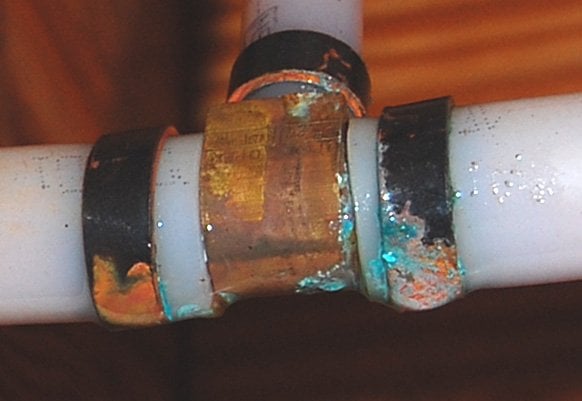
As Real Estate Professionals, it is our top priority to assist clients throughout the home inspection process when buying or selling a home. In all homes, even brand new ones, some building defects will inevitably be discovered during the inspection process that can be easily remedied. A new issue has emerged that catches most home buyers and sellers completely unaware: significant damage to pipes and fittings in the home’s water system that can cost hundreds or thousands of dollars to correct. The culprit? A chemical called “chloramine.”
What is Chloramine
Chloramine is a disinfectant chemical used either in place of chlorine or as a secondary disinfectant product. It is a mixture of chlorine and ammonia. The result: a chemical that is more stable than chlorine. Water treated with chloramine does not have the taste and odor problems of chlorine. Chloramine is currently used in Chatham, Durham, Orange, and Wake counties, as well as Hillsborough township.

Photo courtesy of practicalmachinist.com.
The EPA has deemed chloramine a safe alternative to purify drinking water; however, there have been some unforseen effects that chloramine has on a home’s plumbing supply. In homes constructed after 1980, builders began to use inexpensive high-zinc (up to 40%) brass fittings in cross-linked polyethylene (PEX) plumbing systems. Zinc is a very reactive metal which has a weak ability to bond to other metals. Therefore, when water flows through these brass fittings and valves, it corrodes the brass, and zinc leaches from the plumbing fittings, a process known as “dezincification.”
Problems Associate With Chloramine
Dezincification can cause two problems. First, zinc can accumulate inside the walls of the brass fittings, decreasing water flow and eventually causing a blockage. Second, the porous structure that is left behind has insufficient mechanical strength and is prone to seepage and structural failure. Recirculating water heater systems may be susceptible to dezincification because heat accelerates the buildup of zinc oxide.

Photo courtesy of pureelementswater.com.
In addition, chloarmine can cause damage to copper fittings in the form of pitting or pinhole leaks. The pits left by the chloramine can harbor mold, which is transferred to drinking water. Unfortunately, most insurance companies will not cover the cost to remove mold or exchange plumbing fittings. Air filtration systems can be purchased to protect piping; costs for the systems vary based on the size of the home and the extent of the damage.
According to the Orange Water and Sewer Authority, chloraminated drinking water is completely safe for drinking, bathing, cooking and other daily water uses. However, there are two groups of people who need to take special care with chloraminated water: kidney dialysis patients and fish owners. Chloramines must be removed from the water used in kidney dialysis machines, as they are harmful when they go directly into the bloodstream. Medical clinics that perform dialysis are responsible for purifying the water that enters the dialysis machines. Chloramines in drinking water are also toxic to fish and amphibians. Tap water, therefore, must be treated with an additive before putting fish or frogs in it.
If you are concerned about chloramine in your home, we have provided sources below that will help you protect your plumbing system. There are several Class Action Lawsuits pending in various counties and states across the country regarding the use of chloramine. A lawsuit in South Carolina was recently dismissed by Judge Thierry P. Colaw, who stated that the districts could not be sued over corroded pipes, because they were following district and federal mandates. You can contact your local municipality if you want to know the status of Class Action Lawsuits in your area.
Sources:
Orange Water and Sewer Authority: www.owasa.org
City of Durham: durhamnc.gov/DocumentCenter/View/3658
EPA: www3.epa.gov/region9/water/chloramine
Concerned Citizens About Chloramine: www.chloramine.org/chloraminefacts.htm
Real Estate Experts is committed to providing our clients with insider information, such as this blog post about the hidden dangers of chloramine, to enable them to make informed decisions when buying or selling a home. If you or someone you know is thinking of buying or selling a home, please contact us anytime at 919-813-6449 or [email protected]. Visit us online at realestateexperts.net.

